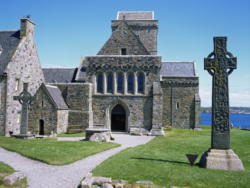 We watched the BBC: three episodes about a pilgrimage, undertaken by celebrities of many faiths and none. They walked and travelled from Saint Columba’s Irish place of birth to his Scottish monastery on Iona, following many paths and errands. The Road to the Scottish Isles really is a nice BBC quality piece of work, still to be viewed on iPlayer until Spring 2023. (Alas, those outside the UK need to find a trick to circumvent geolocation.)
We watched the BBC: three episodes about a pilgrimage, undertaken by celebrities of many faiths and none. They walked and travelled from Saint Columba’s Irish place of birth to his Scottish monastery on Iona, following many paths and errands. The Road to the Scottish Isles really is a nice BBC quality piece of work, still to be viewed on iPlayer until Spring 2023. (Alas, those outside the UK need to find a trick to circumvent geolocation.)
However…
Added a few lines about making shabbat (27-04-2022).
We felt a bit disappointed. It seems that the BBC too has succumbed to the (western) world-wide trend to ‘keep things simple’. But ‘simple’ conversations about God easily tend to get stuck in commonplaces and clichés. As it happened.
The group did have most common British religions on board: christian, muslim, jewish, sikh and atheist. Except for a sikh temple or a synagogue all places of worship were paid a visit. They even made shabbat on Friday. But despite all these encounters – and really, the conversations were honest and often touching – again and again God came up in way that does not help much further beyond these commonplaces.
Because that which some held on to, and others reacted against or struggled with, still was that Supreme Being. The Being in the background who pulls all the strings. Although the old-man-with-a-white-beard was already dismissed in episode 1, some kind of Supreme Being – a ‘something’, ‘power’, ‘energy’, ‘person’, whatever – just could not be sent off.
In christian theology – also in muslim, but less in jewish thinking – many attempts have been made to define God. The classical way appends ‘attributes‘ to God, his (male of course) qualities and features. So God is ‘al’ -mighty and ‘omni’ -scient, -present, -potent. The problem is that by doing so theology is trying to lock God up within time and space, while at the same time insisting he is above and beyond that.
So, the other way is to say what God is not. That makes him ‘in’ -visible, -finite, -comprehensible, -corporeal and ‘im’ -peccable, -mutable. This is called the via negativa, the way of not-saying, and I think it is the wiser way, but still you try to define a Being.
The bible does not really do so. Loads of words are used to say something about God, but it always is what people in certain situations have experienced, thought of, felt, hoped for, believed, rejected etcetera. And it is impossible – yes, an ‘im-‘ – to build a sound system out of all these voices. Thank God.
Biblically speaking ‘God’ actually is a noun, referring to a lot of commonplaces by which human beings try to say something about that which is bigger than any of them can think of. But as soon as biblical writers want to say something more profound than that, they use ’the Name’, the tetragrammaton YHWH, four Hebrew consonants without any pronounciation. (Yes, there is a modern, widely accepted, hypothesis which vowels should be inserted to pronounce it, but those who respect the God of the bible just do not do that.)
The gospel of John famously opens with ‘In the beginning was the Word’ (or ‘As a beginning’) and says that this Word ‘was with God’ and ‘was God’. Now libraries have been filled with expansions and explanations on it, but the simple meaning is that God is a word. It is a construction in language, a construction of that which cannot be measured, weighed or counted, nor calculated in the clear language of mathematics, but still is encountered as a profound reality. A reality within language as well as beyond it.
Perhaps making shabbat was the closest these pilgrims came to ‘God’. Little was said, except for a berakha, a blessing, and any ‘ritual’ was earthly and all joined in equally. There were no ordained people or ritualists. All that counted was being together and making time and space for God to be there, without claiming anything.
Actually it is wise not to assign a specific name to God. That would suggest God is a something. It is wiser to weave words around it, pointing directions, rather than destinations. Because ’the Word’ being ‘with God’ is probably the closest we can get to God. And that should suffice for all our pilgrimages.
So hopefully, on yet another pilgrimage the BBC can create a space for these kind of conversations ‘around’ God. Because if we dare to let God be, we might even be ‘with God’.